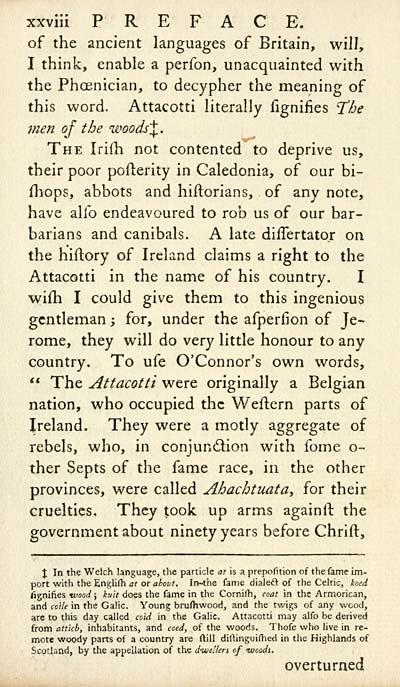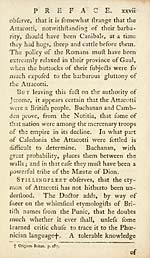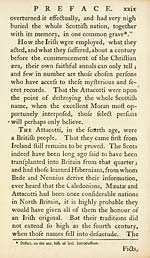Blair Collection > Critical dissertations on the origin, antiquities, language, government, manners, and religion, of the antient Caledonians, their posterity the Picts, and the British and Irish Scots
(34)
Download files
Complete book:
Individual page:
Thumbnail gallery: Grid view | List view

xxviii PREFACE.
of the ancient languages of Britain, will,
I think, enable a perfon, unacquainted with
the Phoenician, to decypher the meaning of
this word. Attacotti literally fignifies The
men of the woods'^.
The Irifh not contented to deprive us,
their poor pofterity in Caledonia, of our bi-
fhops, abbots and hiftorians, of any note,
have alfo endeavoured to rob us of our bar-
barians and canibals. A late dilTertator on
the hiftory of Ireland claims a right to the
Attacotti in the name of his country. I
wifh I could give them to this ingenious
gentleman ; for, under the afperfion of Je-
rome, they will do very little honour to any
country. To ufe O'Connor's own words,
** The Attacotti were originally a Belgian
nation, who occupied the Weftern parts of
Ireland. They were a motly aggregate of
rebels, who, in conjunction with fome o-
ther Septs of the fame race, in the other
provinces, were called Ahachtuata, for their
cruelties. They took up arms againll the
government about ninety years before Chrift,
X In the Welch language, the particle at is a prepofition of the fame im-
port with the Englifh at or about. In-the fame dialeft of the Celtic, koed
hgniftes ivood \ kuit does the fame in the Cornifh, coat in the Armorican,
and coik in the Galic. Young brufhwood, and the twigs of any wood,
are to this day called coid in the Galic. Attacotti may alfo be derived
from atticb, inhabitants, and coed, of the woods. Thofe who live in re-
mote woody parts of a country are ftill diftinguirtied in the Highlands of
Scotland, by the appellation of the dweHen of woods,
overturned
of the ancient languages of Britain, will,
I think, enable a perfon, unacquainted with
the Phoenician, to decypher the meaning of
this word. Attacotti literally fignifies The
men of the woods'^.
The Irifh not contented to deprive us,
their poor pofterity in Caledonia, of our bi-
fhops, abbots and hiftorians, of any note,
have alfo endeavoured to rob us of our bar-
barians and canibals. A late dilTertator on
the hiftory of Ireland claims a right to the
Attacotti in the name of his country. I
wifh I could give them to this ingenious
gentleman ; for, under the afperfion of Je-
rome, they will do very little honour to any
country. To ufe O'Connor's own words,
** The Attacotti were originally a Belgian
nation, who occupied the Weftern parts of
Ireland. They were a motly aggregate of
rebels, who, in conjunction with fome o-
ther Septs of the fame race, in the other
provinces, were called Ahachtuata, for their
cruelties. They took up arms againll the
government about ninety years before Chrift,
X In the Welch language, the particle at is a prepofition of the fame im-
port with the Englifh at or about. In-the fame dialeft of the Celtic, koed
hgniftes ivood \ kuit does the fame in the Cornifh, coat in the Armorican,
and coik in the Galic. Young brufhwood, and the twigs of any wood,
are to this day called coid in the Galic. Attacotti may alfo be derived
from atticb, inhabitants, and coed, of the woods. Thofe who live in re-
mote woody parts of a country are ftill diftinguirtied in the Highlands of
Scotland, by the appellation of the dweHen of woods,
overturned
Set display mode to: Large image | Transcription
Images and transcriptions on this page, including medium image downloads, may be used under the Creative Commons Attribution 4.0 International Licence unless otherwise stated. ![]()
| Permanent URL | https://digital.nls.uk/76286985 |
|---|
| Description | A selection of books from a collection of more than 500 titles, mostly on religious and literary topics. Also includes some material dealing with other Celtic languages and societies. Collection created towards the end of the 19th century by Lady Evelyn Stewart Murray. |
|---|
| Description | Selected items from five 'Special and Named Printed Collections'. Includes books in Gaelic and other Celtic languages, works about the Gaels, their languages, literature, culture and history. |
|---|

